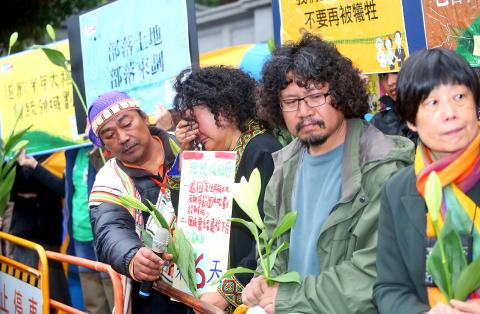New regulations announced by the Council of Indigenous Peoples that exclude privately held land from being recognized as traditional Aboriginal territory perpetuate the injustices done to Aborigines for more than a century, Aboriginal rights advocates said yesterday in Taipei.
A group of protesters, who have been staging a “sleepout” on Ketagalan Boulevard down the street from the Presidential Office Building since Thursday last week, offered lilies to commemorate the 70th anniversary of the 228 Incident and called for the restoration of traditional Aboriginal territories and transitional justice for all Taiwanese, regardless of ethnicity.
Several of the protesters had planned to attend a commemoration ceremony at the 228 Peace Memorial Park to offer condolences to families of the victims of the 228 Massacre, but were prevented from entering the venue.

Photo: CNA
The council on Feb. 14 announced guidelines on the delineation of traditional Aboriginal territories that would restrict the application of the “traditional area” label to government-owned land, explicitly excluding private land.
The exclusion has sparked heated debate. A large amount of Aboriginal territory has been privatized and the exclusion would deprive Aborigines of the rights to participate in the development of traditional territories that were seized and privatized by the Japanese colonial and the Republic of China (ROC) governments, campaigners have said.
Much of the land owned by state-run Taiwan Sugar Corp and private hotel chains in eastern Taiwan was the hunting grounds of Amis communities for hundreds of years, and the new guidelines would only serve to legalize and entrench the misappropriation of Aboriginal land, said documentary filmmaker Mayaw Biho, an Amis and a former director of the state-run Taiwan Indigenous Television.
President Tsai Ing-wen’s (蔡英文) apology for the historical oppression of Aborigines in August last year gave them hope, but the government has once again rejected Aborigines’ rights to their traditional territories, Mayaw said.
“Half a year has passed since the apology, but the ROC government has continued to ignore the plight of the Aborigines,” he said.
“The ROC government takes advantage of Aborigines when it wants to promote the image of Taiwan, but it never relents when it comes to sacrificing their interests,” said singer Nabu Husungan Istanda, who is a Bunun.
“Although it is absolutely correct that the government has sought to address the 228 Incident and the issue of transitional justice, the nation has yet to make an equal effort to redress the injustices done to Aborigines,” said singer-activist Panai Kusui, who is an Amis.
The guidelines are a political expedient agreed between Minister Without Portfolio Chang Ching-sen (張景森) and Council of Indigenous Peoples Minister Icyang Parod, which override Aboriginal rights by using the Han Chinese concept of private ownership, said Lin Fei-fan (林飛帆), one of the leaders of the Sunflower movement in 2014.
“Many Aborigines are willing to negotiate with the government about the conflict between private ownership [and the delineation of traditional areas], but I want to ask if the government is willing to offer such an opportunity,” Lin said.

CHANGING LANDSCAPE: Many of the part-time programs for educators were no longer needed, as many teachers obtain a graduate degree before joining the workforce, experts said Taiwanese universities this year canceled 86 programs, Ministry of Education data showed, with educators attributing the closures to the nation’s low birthrate as well as shifting trends. Fifty-three of the shuttered programs were part-time postgraduate degree programs, about 62 percent of the total, the most in the past five years, the data showed. National Taiwan Normal University (NTNU) discontinued the most part-time master’s programs, at 16: chemistry, life science, earth science, physics, fine arts, music, special education, health promotion and health education, educational psychology and counseling, education, design, Chinese as a second language, library and information sciences, mechatronics engineering, history, physical education

The High Prosecutors’ Office yesterday withdrew an appeal against the acquittal of a former bank manager 22 years after his death, marking Taiwan’s first instance of prosecutors rendering posthumous justice to a wrongfully convicted defendant. Chu Ching-en (諸慶恩) — formerly a manager at the Taipei branch of BNP Paribas — was in 1999 accused by Weng Mao-chung (翁茂鍾), then-president of Chia Her Industrial Co, of forging a request for a fixed deposit of US$10 million by I-Hwa Industrial Co, a subsidiary of Chia Her, which was used as collateral. Chu was ruled not guilty in the first trial, but was found guilty

Taiwan-based publisher Li Yanhe (李延賀) has been sentenced to three years in prison, fined 50,000 yuan (US$6,890) in personal assets and deprived political rights for one year for “inciting secession” in China, China's Taiwan Affairs Office spokesman Chen Binhua (陳斌華) said today. The Shanghai First Intermediate People’s Court announced the verdict on Feb. 17, Chen said. The trial was conducted lawfully, and in an open and fair manner, he said, adding that the verdict has since come into legal effect. The defendant reportedly admitted guilt and would appeal within the statutory appeal period, he said, adding that the defendant and his family have

DEADLOCK: As the commission is unable to forum a quorum to review license renewal applications, the channel operators are not at fault and can air past their license date The National Communications Commission (NCC) yesterday said that the Public Television Service (PTS) and 36 other television and radio broadcasters could continue airing, despite the commission’s inability to meet a quorum to review their license renewal applications. The licenses of PTS and the other channels are set to expire between this month and June. The National Communications Commission Organization Act (國家通訊傳播委員會組織法) stipulates that the commission must meet the mandated quorum of four to hold a valid meeting. The seven-member commission currently has only three commissioners. “We have informed the channel operators of the progress we have made in reviewing their license renewal applications, and